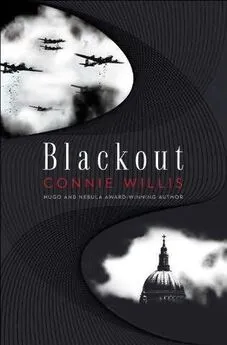Connie Willis - Blackout
- Название:Blackout
- Автор:
- Жанр:
- Издательство:неизвестно
- Год:неизвестен
- ISBN:нет данных
- Рейтинг:
- Избранное:Добавить в избранное
-
Отзывы:
-
Ваша оценка:
Connie Willis - Blackout краткое содержание
In her first novel since 2002, Nebula and Hugo award-winning author Connie Willis returns with a stunning, enormously entertaining novel of time travel, war, and the deeds—great and small—of ordinary people who shape history. In the hands of this acclaimed storyteller, the past and future collide—and the result is at once intriguing, elusive, and frightening.
Oxford in 2060 is a chaotic place. Scores of time-traveling historians are being sent into the past, to destinations including the American Civil War and the attack on the World Trade Center. Michael Davies is prepping to go to Pearl Harbor. Merope Ward is coping with a bunch of bratty 1940 evacuees and trying to talk her thesis adviser, Mr. Dunworthy, into letting her go to VE Day. Polly Churchill’s next assignment will be as a shopgirl in the middle of London’s Blitz. And seventeen-year-old Colin Templer, who has a major crush on Polly, is determined to go to the Crusades so that he can “catch up” to her in age.
But now the time-travel lab is suddenly canceling assignments for no apparent reason and switching around everyone’s schedules. And when Michael, Merope, and Polly finally get to World War II, things just get worse. For there they face air raids, blackouts, unexploded bombs, dive-bombing Stukas, rationing, shrapnel, V-1s, and two of the most incorrigible children in all of history—to say nothing of a growing feeling that not only their assignments but the war and history itself are spiraling out of control.
Blackout - читать онлайн бесплатно полную версию (весь текст целиком)
Интервал:
Закладка:
At least the contemps here had the excuse that the news from France had been heavily censored. On the other hand, they’d been at war for over eight months, during which Hitler had sliced through half of Europe like a knife through butter. And Dunkirk was right across the Channel. You’d think they’d have figured out something was up.
But apparently not. None of the farmers and fishermen who came in over the next hour discussed anything but the weather, and all Daphne was interested in talking about was American movie stars. “I suppose you meet a lot of them, being a reporter. Have you ever met Clark Gable?”
“No.”
“Oh,” she said, sounding even more disappointed than when he’d told her there weren’t any red Indians. “He’s my favorite film star,” and proceeded to tell him the entire plot of a movie she’d seen the week before, involving spies, amnesia, and an epic search for a lost love. “He searched for her for years and years,” Daphne said. “It was terribly romantic.”
And meanwhile, up in Dover, the Royal Navy’s organizing boats into convoys, and retired sailors and paddleboat captains and fishermen are volunteering to man them, Mike thought, and I’m missing it. And it wasn’t as if he could go back to Oxford and try again. Once an historian had been in a temporal location, he couldn’t be in it again, and that wasn’t just one of Dunworthy’s overprotective precautions. It was a law of time travel, as a couple of early time travelers had found out the hard way. The night of the twenty-eighth and now the morning of the twenty-ninth were off-limits to him forever.
Maybe I can do what’s left of the evacuation and then go back and come through and do the first three days, he thought, but Dunworthy would never let him. If something went wrong and he was still here when his deadline on the twenty-eighth arrived, he’d be the one who was dead. And on a second try there might be even more slippage.
Nine o’clock, and then nine-thirty and ten, came and went with no sign of Mr. Powney. I can’t afford to sit here all day, Mike thought and told Daphne he was going to go look around the village.
“Oh, but I’m certain Mr. Powney will be along soon,” Daphne said. “He must have got a late start.”
So did I, Mike thought. He told her he needed to interview some of the other locals on invasion preparations, made her promise to come find him if Powney arrived, and left the inn. Somebody had to have a vehicle in this place. It was 1940, for God’s sake, not 1740. Somebody had to have a car. Or a boat, though he didn’t like the idea of going out in the Channel, which was full of mines and U-boats. More than sixty of the seven hundred small craft that had participated in the evacuation had been sunk. He’d only go by boat as a last resort.
But even though he looked in every alley and back garden, he didn’t see anything, not even a bicycle. And Dover was too far to make it on a bicycle. He walked down to the quay, where three fishermen, including toothless Mr. Tompkins, were lounging and discussing-what else?-the weather.
“Looks bad,” one of them said without taking his pipe out of his mouth.
Mr. Tompkins mumbled something unintelligible, and the other one, who smelled strongly of fish, nodded agreement.
“I need to get to Dover,” Mike said. “Is there anyone here who’d be willing to take me there in his boat?”
“I doot yill fond onion heerbuts,” Mr. Tompkins said.
Since he shook his head as he spoke, Mike interpreted that as a no. “What about one of you? I could pay…” He hesitated. Three pounds was obviously too much. “Ten shillings,” he said.
That was obviously too little. Tompkins and the fishy one immediately shook their heads. “It’s blowin’ up a storm,” the pipe smoker said.
The Channel had been “as still as a millpond” the entire nine days of the evacuation, but Mike couldn’t very well say that. “I’ll pay you a pound.”
“Nay, lad,” the fishy one said. “Channel’s too dangerous.”
Clearly none of these three would be volunteering to go to Dunkirk. He’d have to find somebody else. He started down the quay. “Harold mot be able to run you up,” the pipe smoker called after him.
“Harold?” Mike said, coming back.
“Aye, Commander Harold,” he said and the fishy one nodded.
A naval officer. Good. He’d know how to steer clear of U-boats and mines. “Where can I find him?”
“Ye’ll fand’m ont’ Lassie June,” Mr. Tompkins said. “He’s bin work nonner sin smale vises skill litter coom furnit buck.”
Mike turned to the pipe smoker. “Where can I find the-what did you say the name of his boat was?” but before he could answer, Mr. Tompkins said, “Tletty Gin.” He pointed down the dock. “She’s doonthur at thind nix harbin ersees pride.”
Which meant God knew what, but there weren’t that many boats lined up along the dock, and their names should be painted on their bows. He thanked the trio for their help, such as it was, and walked down the pier, looking at the tied-up boats: the Marigold, the Princess Margaret, the Wren. The names didn’t sound very warlike, but then neither had the names of the yachts and barges and fishing smacks that were about to pull off the biggest military evacuation in history: the Fair Breeze, the Kitty, the Sunbeam, the Smiling Through.
But hopefully they’d been in better shape than this bunch. Most of them were ancient, none had been scraped or painted in recent memory, and one, the Sea Sprite, had its motor spread out in pieces on its deck. Obviously it wasn’t going to Dunkirk, but some of the others would. Boats from every coastal village had been involved. He wished he’d had time to memorize the list of small craft that had been part of the evacuation so he’d know which, if any, of these had participated.
And which of them had made it back. The list had had asterisks next to the names of the ones that had been sunk. If he hadn’t wasted a whole afternoon waiting to see Dunworthy, he’d know which was which.
He reached the end of the dock. No Tletty Gin. Or Lassie June. He started back along the row. “Ahoy!” a voice called, and Mike looked up to see an elderly man in a yachting cap at the railing of a forty-foot launch. “You there! Are you from the Small Vessels Pool?”
“No,” Mike said. “I’m looking for a Commander Harold.”
The old man broke into a broad-and, thankfully, toothy-smile. “I’m Commander Harold. You must be from the Admiralty. You’ve come about my commission. Thought I’d never hear from you. Come aboard.”
This was Commander Harold? He had to be seventy if he was a day, and no wonder he hadn’t heard from the Admiralty about being commissioned. Mike peered at the bow, looking for the boat’s name. There it was, so badly faded he could hardly make it out. The Lady Jane.
An unlucky name for a boat. Lady Jane Grey had only lasted as queen something like nine days before they’d chopped her head off, and the launch didn’t look like it would last long either. It was covered with barnacles and hadn’t been painted in years. “Come aboard, lad,” the Commander was saying, “and tell me about my commission-”
“I’m not from-”
“What are you standing there for? Come aboard.”
Mike did. Up close, the old man looked even older. His hair under the yachting cap was white and fine as thistledown, and his hand, snapping a salute, was gnarled with arthritis. “I’m not from the Admiralty either,” Mike said hastily. “I’m-”
“Suppose they’ve a new wartime department just for issuing commissions. In my day, His Majesty’s Navy didn’t have all these departments and regulations and forms to fill up. What would have happened to Lord Nelson at Trafalgar if he’d had to fill up all the forms they have nowadays?”
Nelson had been killed at Trafalgar, but it didn’t seem wise to say that, even if Mike could have gotten a word in edgewise, which he couldn’t.
“It’s a wonder they ever manage to get their ships out of dry dock these days,” Commander Harold said, “what with all the paperwork. Do you know how long it’s taken for this commission to come through?” He didn’t wait for an answer. “Nine months. Put in for it the day after the war started, and it’s taken you all this time. In my day, I’d already have been at sea. Well? What sort of ship have they given me? Battleship? Cruiser?”
“I’m not from the government at all. I’m a reporter.”
The Commander’s face fell.
“For the Omaha Observer.”
“Omaha. That’s in Kansas, isn’t it?”
“Nebraska.”
“What are you doing in Saltram-on-Sea?”
“I’m writing a story on Britain’s invasion preparations.”
“Preparations!” the Commander snorted. “What preparations? Have you been out on the beach here, Kansas? It looks like a bloody holiday spot. No barricades, no tank traps, not even any barbed wire. And when I complained to the Admiralty, do you know what the young pup there said? ‘We’re waiting for authorization from headquarters.’ And do you know what I said? ‘If you wait much longer, you’ll be asking Himmler!’ Can you swim?”
“Swim?” Mike said, lost. “Yes, I-”
“In my day, every man in His Majesty’s Navy had to know how to swim, from the admiral on down. Now half of ’em’ve never even been to sea. They sit in London, typing up authorizations. Come here, Kansas, I want to show you something.”
“The reason I came was to ask you-” Mike began, but the Commander had already disappeared down a hatch. Mike hesitated. If Mr. Powney showed up, Daphne wouldn’t know where he’d gone. Mike didn’t want to miss him. But he also needed to find out if the Commander would be willing to take him to Dover. If he would, it’d be the fastest way to get there, and it would solve the problem of how to get out onto the docks so he could interview the returning boats. And if they kept close to the shore, the Channel wouldn’t be all that dangerous.
Mike looked over at the head of the quay. The three old men were still lounging there. They’d tell Daphne where he was. If she can understand what they say, he thought, and climbed down after the Commander.
It was dark inside the hatch. Momentarily blinded, Mike groped for the rungs as he climbed down the ladder and stepped off it.
Into a foot of water.
What country, friends, is this?
-WILLIAM SHAKESPEARE, TWELFTH NIGHTOxford-April 2060
THE SHIMMER WAS ALREADY SO BRIGHT POLLY COULDN’T see the lab or even the draperies, only the opening drop. She knew there wasn’t enough time to tell Badri and Linna to give her apologies to Colin, but she made the attempt. “Tell Colin what happened,” she shouted into the brightness, “that there wasn’t time to let him know. Tell him I’m sorry and that I said thank you for all his help, and I’ll see him when I get back,” but it was too late. She was already through.
In a cellar. In the near-darkness, she could only just make out a brick wall and a black door from which the paint was peeling badly. There were brick walls on either side, too, and a low ceiling, and behind her, three steps leading up to the rest of the brick-paved cellar, which was filled with barrels and packing cases. Ordinarily a cellar would be a good place to come through, but this was the Blitz, when cellars had been used as shelters. She stood still a moment, listening for the sound of voices-or snoring-in the part of the cellar she couldn’t see, but she couldn’t hear anything. She quietly tried the door. It was locked.
Wonderful. She’d come through in a locked cellar, and one that, as she peered more closely at it in the gloom, looked as though it had been locked a very long time. A spiderweb, with several dead leaves caught in it, was strung from the lower door hinge to the dirt floor, so unless there was a window she could climb out of, she’d have to wait here till the drop opened and make Badri find another site. And hope Mr. Dunworthy didn’t cancel her assignment in the meantime.
Читать дальшеИнтервал:
Закладка:

![Jane_BlackCat - Понять не поздно... [СИ]](/books/1148838/jane-blackcat-ponyat-ne-pozdno-si.webp)
![Jane_BlackCat - За краем Вечности [СИ]](/books/1148839/jane-blackcat-za-kraem-vechnosti-si.webp)

